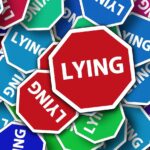Lying whether to spare someone’s feelings or to dupe someone in high-stakes negotiation occurs every day in life and in business. In fact, human evolution has rewarded lying. Evolutionary biologists claim that humans are particularly adept at lying because those who were better at deception did better in terms of reproductive success compared to those who were always honest.
Whether to deceive a mate about other sexual partners to procreate with more persons of the opposite sex, or to maintain a high position in the social hierarchy to make sure their offspring made it to maturity, evolution has allowed liars to pass along their genes more readily than honest people. Natural selection has therefore made all humans great liars. The only difference is the degree to which all of us lie.
There are good liars and some not-so-good liars. Being able to identify situations when a person is most likely to lie will make it much easier to know when you should pull out your bull-shit detector, and begin looking for evidence of lying behaviors.
Lying in Business
Lying in business situations is very common. In fact, individuals are far more likely to lie to a co-worker or a customer since they want to maintain a certain persona than they are to lie to a stranger who they likely will never see again.
Individuals are far more likely to lie co-workers and customers than to a stranger
When it comes to business, whether an employee is trying to keep their job, advance to the next position, or if an owner is trying to keep from losing his shirt in a negotiation or to maximize their business investment, the stakes are usually pretty high when it comes to business situations.
“The higher the stakes, the more likely people are to lie.”
One reason business people are especially prone to lying is to maintain a positive reputation with subordinates, peers, managers, and customers. Moreover, many business people derive a high degree of their own self-worth from their job performance. Covering up mistakes with a few little lies or lies through omission is considered by many to be an acceptable behavior considering the alternatives. They figure the ends justify the means. Managers and business owners are particularly susceptible to lying since they have more at stake financially and are not willing to give up their title or the trappings that their life and position may provide.
For the most part, people lie to fill in the gaps between who they really are and what they want to be. According to Susan Carnicero, a former CIA officer and one of the authors of the book Spy the Lie, men are eight times more likely than women to lie about themselves, and women are more likely to lie to protect another person. She also says that extroverts are more likely to lie then introverts.
How People Lie
When it comes to true dishonesty, lying is less likely to occur over text messages or through email primarily because of the paper trail that is left. However, lying using text or email is very prevalent when it comes to sharing a person current status known as “butler lies” An example of a butler lie is when you left home late and send a text message stating that you are running late because of traffic.
On the flip side, lying is more likely to occur when people can’t see the other party face-to-face, such as when they are on the phone. Studies have shown people are likely to lie when somebody can’t see your face- particularly your eyes.
I can hear some of you saying ‘What about video conferencing?’

Unfortunately, video conferencing is not a great solution to detect lying. A person’s eyes may betray that the other person is lying and on a video conference, the other person is rarely looking directly into the camera. Instead, most people will look at an image of themselves or the other party on the screen making it look like the person is always looking down during a video conference. Therefore, while video conferencing is technically face-to-face, it is not eye-to-eye which is one of the many ways to detect when someone is lying. Moreover, video conferencing often only shows a person’s face and not the rest of their body. Gestures and body language can show other clues that a person is being less than truthful.
Why We Are Poor Lie Detectors
Lying is a cooperative act. What I mean is that one person has to perpetrate a lie and the other party has to buy into it. Being aware that you are being lied to can break the cycle, but unfortunately, many people want to believe the lie rather than look for clues that the other person is lying.
One factor that makes it hard to detect lies is a person’s own greed. We get so wrapped up in the potential outcome and want to believe the liar. There is no place that this is more apparent than in sales situations, and that’s why tapping into a prospect’s emotion about money is so powerful.
A perfect example comes from the oil and gas industry, which is why I created www.learnaboutoilandgas.com, the host for this blog, to help people objectively assess an investment in oil and gas.

Here’s how a typical oil investment sales scenario goes. It starts with a phone call where the salesperson tells you about this great opportunity to make a huge return on your investment while being able to shelter much of the income from the tax man. This is a perfect storm for the less-than-honest salesperson since their initial call is over the phone and you can’t see any of the clues that might give them away as lying. Your greed about making large sums of money make you want to believe them.
Offensive vs. Defensive lies
Lying in business can be grouped into two categories-defensive lies and offensive lies. There are four primarily offensive lies and five defensive lies.
Offensive Lies
1. Get Rewards – People will often lie to obtain some type of reward, such as getting a new contract or making a sale to earn a commission.
2. Gain an Advantage – To gain an advantage, business people often lie to get the other person to disclose information they might normally guard. I have seen situations where a company will fake interest in acquiring another business, only to get a look at the company’s books.
3. Create Positive impression – Everyone wants to project a positive image to others. Lies to create a good impression often comes in the form of exaggerated claims. One of the most common forms of lying to create a positive impression is when a person embellishes their accomplishments in their resume.
Sales presentations are another common place where lies are introduced so that the prospect will have a positive impression of the product or service being offered.
4. Exercise Power Over Others – One way a liar can exercise their power over others is by controlling or falsifying the information another person has. Sometimes these lies may be false information provided to the other party to make them go down a wrong path other times is may be through the omission of necessary information.
Defensive Lies
5. Avoid Embarrassment – Lying to avoid being embarrassed will often be a lie of omission, such as failing to disclose that you never learned to drive a car. This type of lie also might include telling someone that their presentation was good- even when it wasn’t- to spare the other party the embarrassment of saying their presentation really sucked.
6. Protect Someone – Perhaps one of the most common forms of lying is to protect another person because such an act makes one feel more justified in this type of lie. An example of a lie to protect another person is to provide the other person with a false alibi so that they do not get into trouble or get punished.
7. Protect from Emotional or Physical Harm – Lying to protect someone from emotional or physical harm is also another very common type of lie since it feels particularly justified when it comes to helping someone avoid a physical or emotional charged situation.
8. Get Out of Social Situations – Many social situations can be awkward and people often will make up false excuses to avoid awkward conversations. For example, a manager might tell their secretary to interrupt them after 15 minutes if they are still in a meeting in an effort to get a salesman that does not take no for an answer out of their office.
9. Maintain Privacy – People often want to maintain a degree of privacy in their lives and tell lies to keep others from discovering the truth about them. A common example is where a person in an interview will say that they resigned from their previous job, when in fact they were actually fired or infer that they are not gay when in fact, they are.
Related posts:
- How to Spot Lying & Deceptive Behaviors
- How To Tell If Someone Is Lying Using Questioning Techniques
How aware are you of situations where people are most prone to lying?












